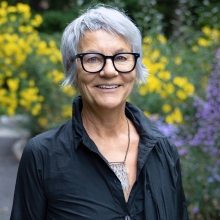Penn Arts & Sciences Launches Plant ARC

Penn Arts & Sciences recently launched the Plant Adaptability and Resilience Center, or Plant ARC. The center, led by Doris Wagner, DiMaura Professor of Biology, aims to enhance plant development and fortitude in the face of climate change, which impacts food security, human health, and ecosystems through evermore extreme and unpredictable weather events like heatwaves, droughts, and floods. Anchored in the Department of Biology, Plant ARC will collaborate broadly across departments and with schools and centers across the University, as well as with local stakeholders, and beyond.
“Penn is the ideal place for Plant ARC because of its commitment to climate change solutions across schools and disciplines,” Wagner says. “Plants sustain all life on Earth and are crucial for ecosystems and climate regulation. By safeguarding essential species interactions, understanding how climate change affects plant physiology and development, and developing climate-resistant crops, Plant ARC will devise scalable, research-driven solutions that boost food security and ecosystem resilience, from urban farms in Philadelphia to global agricultural systems.”
To facilitate its research, Plant ARC will build phytotrons, programmable climate chambers that will allow Plant ARC team members to simulate past, current, and future climates from anywhere in the world; reproduce a given climate precisely in replicate experiments; and test plant response to successive, but different, climate exposures. The end goal is precision improvement of plant traits for agriculture and ecosystems generally and specifically in the urban setting.
“Plant ARC is a tremendously exciting idea, allowing Penn researchers to further develop fundamental plant research and to harness the resulting advances in plant adaptability and resilience against the effects of climate change,” says Mark Trodden, Associate Dean for the Natural Sciences, Fay R. and Eugene L. Langberg Professor of Physics, and Co-Director of the Penn Center for Particle Cosmology. “This Center represents an important pillar in our broad efforts in sustainability and climate in the School of Arts & Sciences.”
The Center is involved in multiple recent and upcoming events, including the Penn Science Café: Plants on a Warming Planet, which focused on the complexity of plant responses to climate change, and the 1.5* Minute Climate Lectures during Climate Week at Penn.





